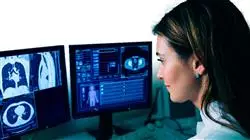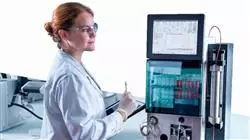University certificate
The world's largest faculty of medicine”
Introduction to the Program
You will find the best contents on Artificial Intelligence and IoT Applications to Telemedicine in this incredible Postgraduate certificate"

The integration of technological elements within Telemedicine has become a widely used exercise in recent years. This thanks to the evolution of systems and the increase in the amount of information handled in the medical field, making the implementation of these tools increasingly necessary. For this reason, it is essential to have healthcare professionals who are specialized in this knowledge and who are fully trained to apply the latest A.I. and IoT techniques in their daily practice.
For this reason, it is offered to professionals who want to make a deep update of their knowledge this Postgraduate certificate in Applications of Artificial Intelligence and IoT to Telemedicine, which aims to give students a complete learning about the latest techniques and tools that provide these instruments to the medical field.
During the academic program, topics such as the E-Health platform, AI algorithms for image processing, natural language processing in Telemedicine, the Internet of Things as a functional tool for the development of consultations or treatments and the application of types of nano-robots focused on this sector will be addressed.
And all this, by means of the innovative Relearning methodology, which allows the student to learn from the comfort of their home and at the time of their choice, since they will have full access 24 hours a day to the multimedia resources that they will find in the virtual campus. In addition, you will be taught by an excellent teaching staff, which is made up of the best professionals in A.I. and IoT and who will convey the real picture of this field.
You have the ambition to be the best and TECH has the tools to achieve it. Enroll now"
This Postgraduate certificate in Artificial Intelligence and IoT Applications in Telemedicine contains the most complete and up-to-date scientific program on the market. The most important features include:
- The development of case studies presented by experts in Artificial Intelligence and IoT Applications in Telemedicine
- The graphic, schematic, and practical contents with which they are created, provide scientific and practical information on the disciplines that are essential for professional practice
- Practical exercises where self-assessment can be used to improve learning
- Its special emphasis on innovative methodologies
- Theoretical lessons, questions to the expert, debate forums on controversial topics, and individual reflection assignments
- The availability of access to content from any fixed or portable device with an Internet connection
What are you waiting for to advance in your career? Take this degree and explore a vast sea of Telemedicine knowledge" What are you waiting for to advance in your career? Take this degree and explore a vast sea of Telemedicine knowledge"
The program’s teaching staff includes professionals from sector who contribute their work experience to this educational program, as well as renowned specialists from leading societies and prestigious universities.
Its multimedia content, developed with the latest educational technology, will provide the professional with situated and contextual learning, i.e., a simulated environment that will provide an immersive education programmed to learn in real situations.
The design of this program focuses on Problem-Based Learning, by means of which the professional must try to solve the different professional practice situations that are presented throughout the academic course. For this purpose, the student will be assisted by an innovative interactive video system created by renowned experts.
Get updated on the latest technologies that allow remote monitoring of vital signs, better known as weareble"

From anywhere and at anytime of the day you want, you will get an extensive update on the latest developments in this field"
Why study at TECH?
TECH is the world’s largest online university. With an impressive catalog of more than 14,000 university programs available in 11 languages, it is positioned as a leader in employability, with a 99% job placement rate. In addition, it relies on an enormous faculty of more than 6,000 professors of the highest international renown.

Study at the world's largest online university and guarantee your professional success. The future starts at TECH”
The world’s best online university according to FORBES
The prestigious Forbes magazine, specialized in business and finance, has highlighted TECH as “the world's best online university” This is what they have recently stated in an article in their digital edition in which they echo the success story of this institution, “thanks to the academic offer it provides, the selection of its teaching staff, and an innovative learning method aimed at educating the professionals of the future”
A revolutionary study method, a cutting-edge faculty and a practical focus: the key to TECH's success.
The most complete study plans on the university scene
TECH offers the most complete study plans on the university scene, with syllabuses that cover fundamental concepts and, at the same time, the main scientific advances in their specific scientific areas. In addition, these programs are continuously being updated to guarantee students the academic vanguard and the most in-demand professional skills. In this way, the university's qualifications provide its graduates with a significant advantage to propel their careers to success.
TECH offers the most comprehensive and intensive study plans on the current university scene.
A world-class teaching staff
TECH's teaching staff is made up of more than 6,000 professors with the highest international recognition. Professors, researchers and top executives of multinational companies, including Isaiah Covington, performance coach of the Boston Celtics; Magda Romanska, principal investigator at Harvard MetaLAB; Ignacio Wistumba, chairman of the department of translational molecular pathology at MD Anderson Cancer Center; and D.W. Pine, creative director of TIME magazine, among others.
Internationally renowned experts, specialized in different branches of Health, Technology, Communication and Business, form part of the TECH faculty.
A unique learning method
TECH is the first university to use Relearning in all its programs. It is the best online learning methodology, accredited with international teaching quality certifications, provided by prestigious educational agencies. In addition, this disruptive educational model is complemented with the “Case Method”, thereby setting up a unique online teaching strategy. Innovative teaching resources are also implemented, including detailed videos, infographics and interactive summaries.
TECH combines Relearning and the Case Method in all its university programs to guarantee excellent theoretical and practical learning, studying whenever and wherever you want.
The world's largest online university
TECH is the world’s largest online university. We are the largest educational institution, with the best and widest online educational catalog, one hundred percent online and covering the vast majority of areas of knowledge. We offer a large selection of our own degrees and accredited online undergraduate and postgraduate degrees. In total, more than 14,000 university degrees, in eleven different languages, make us the largest educational largest in the world.
TECH has the world's most extensive catalog of academic and official programs, available in more than 11 languages.
Google Premier Partner
The American technology giant has awarded TECH the Google Google Premier Partner badge. This award, which is only available to 3% of the world's companies, highlights the efficient, flexible and tailored experience that this university provides to students. The recognition as a Google Premier Partner not only accredits the maximum rigor, performance and investment in TECH's digital infrastructures, but also places this university as one of the world's leading technology companies.
Google has positioned TECH in the top 3% of the world's most important technology companies by awarding it its Google Premier Partner badge.
The official online university of the NBA
TECH is the official online university of the NBA. Thanks to our agreement with the biggest league in basketball, we offer our students exclusive university programs, as well as a wide variety of educational resources focused on the business of the league and other areas of the sports industry. Each program is made up of a uniquely designed syllabus and features exceptional guest hosts: professionals with a distinguished sports background who will offer their expertise on the most relevant topics.
TECH has been selected by the NBA, the world's top basketball league, as its official online university.
The top-rated university by its students
Students have positioned TECH as the world's top-rated university on the main review websites, with a highest rating of 4.9 out of 5, obtained from more than 1,000 reviews. These results consolidate TECH as the benchmark university institution at an international level, reflecting the excellence and positive impact of its educational model.” reflecting the excellence and positive impact of its educational model.”
TECH is the world’s top-rated university by its students.
Leaders in employability
TECH has managed to become the leading university in employability. 99% of its students obtain jobs in the academic field they have studied, within one year of completing any of the university's programs. A similar number achieve immediate career enhancement. All this thanks to a study methodology that bases its effectiveness on the acquisition of practical skills, which are absolutely necessary for professional development.
99% of TECH graduates find a job within a year of completing their studies.
Postgraduate Certificate in Artificial Intelligence and IoT Applications to Telemedicine
The Postgraduate Certificate in Artificial Intelligence and IoT Applications to Telemedicine created by TECH Global University, is the answer to your needs. This program provides you with the necessary tools to explore the applications of Artificial Intelligence and the Internet of Things in the healthcare sector. You will learn about the integration of technologies such as data analytics, machine learning and process automation in healthcare.
During the course, you will dive into the world of Telemedicine and discover how Artificial Intelligence and IoT can improve patient care and the efficiency of healthcare systems. You will learn about medical data collection, remote monitoring, early disease identification and chronic disease management. In addition, you will gain practical skills in implementing digital health technologies and interpreting the results.







